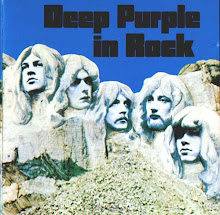A few people have asked me, in regard to my 'Best of the Fest' post of a couple of weeks ago, if that's all I saw. Good heavens, NO! Don't be silly!
I had a fairly light show-going schedule this year, because I could only manage 5 or 6 days there, rather than my usual 10 or 12. And because the tickets are getting so bloody expensive.
But heck, no, I probably saw at least twice as much as I wrote about there. On occasion, I'll go and see 6 or 7 different things in one day.
Along with my obligatory token comedy show at The Stand (I go to one just about every year; usually only one, but....) and a couple of jazz nights at The Guildford (one of my favourite pubs in the city; and scene of last year's 'inappropriate erotic encounter' - there's always one at Edinburgh, it seems!), I also happened to catch one of the last gigs in the Jazz & Blues Festival (it always catches me out by starting a week or so earlier than everything else) at The Jam House on a drizzly Sunday afternoon; the highlight there was a young electric blues trio called Tantrum (undergraduates not yet out of their teens - god, it makes me feel old! I liked them so much I bought one of their CDs!).
The other dramatic offerings I caught, but didn't feel inclined to recommend were:
Forgotten Voices - a piece about WWI, recalled through the oral histories of survivors many years later. Now, this was all very worthy, quite moving in parts, very decently performed - just not very enlightening (well, not for me - I've read extensively on the First War, and there wasn't one of these anecdotes that told me anything new) and not very theatrically compelling (it could have been done on the radio; and, indeed, would probably have been more effective in that medium). Five septuagenarians meeting in the early '70s at the Imperial War Museum, after recording their testimonies for the archive, repeating some of the memories as small talk - there's not really anything dramatic about it. Interesting human stories, but rather lazily cobbled together. I confess I went largely to see Belinda Lang, the only female cast member, a rather lovely British actress who I've had a crush on for 20-odd years. My ardour was slightly dampened by the discovery that she is now over 50 (and, in this show, was playing 75!). Adolf - a long-running, mildly notorious one-man show by Pip Utton. I'd been hearing good things about it for a few years, so thought I'd better check it out before he finally gets bored of doing it. The imagined final self-justification of Hitler during his last hours in the bunker has its moments of interest, but I found the impersonation a little weak; and the monologue was at times somewhat repetitive, could have been more tightly written. The 'trick' of the piece is that barely half-way through, Utton takes off the Hitler costume and becomes 'himself' again, bantering amiably with the audience about the show. Amiably, at least, at first; gradually a few commonplace racist jokes ("The Romans had the right idea: build your roads long and straight, and your immigrants can't open corner shops all over the place.") develop into a more thoroughgoing xenophobic agenda - illustrating how easily the Fuhrer can achieve his final wish, that he should attain immortality through his ideas, the poisonous ideas that can so easily find a place in anyone's heart. It's a neat idea, but, having heard quite a bit about the show beforehand, there was no element of shock or surprise in it for me - and no element of discomfort as to how far these might be Utton's real views. I suspect the effectiveness of this closing section depends very largely on audience reaction too. I have been told that it can get quite lively, with people jeering or walking out. On the day I went, nobody rose to the bait.
American Poodle - a pair of one-man pieces "on the Anglo-American relationship" by Guy Masterson and David Calvitto. I was drawn to this partly by the title, partly by the hope of seeing some decent satire (something of a dying - or dead - art, I fear), and by a curiosity to see Masterson performing (he's a prolific director, usually has 5 or 10 shows on at The Fringe every year; but I've never seen him act before). And yes, I may have been a little suckered by the blurb that read "caustic, clever, hyper-articulate, and inspired". That sounds like my buddy, The Arts Entrepreneur - on one of his good days, anyway. In regard to this piece, it was unwarranted hyperbole. Masterson's monologue was a re-telling of early American history from a British perspective, asserting that the Crown's attempt to put a tax on tea wasn't so unreasonable and that revered revolutionary heroes like John Hancock were actually pretty nasty pieces of work. There's a lot to that. And it was done with great gusto, and was often very funny. The trouble was that he burned himself out on the Revolution - which had little point of contact with contemporary events - and left himself just a scant few sentences to sum up the relations between the two countries over the 200 years since. Calvitto was a contemporary American businessman, visiting London for the first time on a mysterious errand. Most of the jokes seemed to be at the expense of American ignorance and naivety (this was very much Homer Simpson, the amiable idiot abroad, continually surprised that things weren't quite as they'd been depicted in Mary Poppins) rather than revealing any major faults in London or Londoners. It was delivered at breakneck pace, and had a few decent jokes in it, but - as with Masterson's history lesson - it really lacked any satirical teeth. I'm always fascinated by - and always disposed to admire and enjoy - one-man performances because it takes such a tremendous amount of energy and focus and sheer balls to hold a stage alone for any length of time. On this occasion, as so often, I left admiring the performances alone, rather than the content.
Exits and Entrances - a new play ("World Premiere", apparently) from Athol Fugard, based on his meetings with Andre Huguenet, a giant of the South African stage whom he had known briefly at the outset of his writing career in the '50s. Ah, how many plays have been set backstage, chronicling the artistic agony of the performer? How many of them have actually been any good? It's a sign of how lazy the writing of this one is that it relies so heavily on extended extracts from Sophocles' Oedipus Rex and from another play I wasn't familiar with called The Prisoner (and, more briefly but still rather lamely, from Hamlet). The actor playing the grand old thespian was very impressive. The actor (I didn't catch either of the names, unfortunately) playing Fugard himself was whiny and irritating. Perhaps this was also a good performance (the writing throughout seemed to betray its author as insufferably pompous and unself-aware), but it was rather alienating of audience interest. And perhaps the milieu was just too obscure: apart from never having achieved any financial success, it was impossible for me to discern what Andre's great - unfulfilled - artistic goal in life had been, or why he felt so disillusioned and defeated upon the founding of the Republic of South Africa. This struck me as an extremely dull, clumsy, under-written play. I was concerned that I might perhaps be over-reacting, since in general Fugard has a pretty high reputation. Luckily, The Arts Entrepreneur reassured me: "Oh, god, no - Fugard's a terrible writer. Nobody would read him if he weren't South African."
So, there you have it. A few more reviews.
That'll probably be it until Fringe time next year. I get to see precious little theatre here in Beijing.
How I wish I could find a way to bring some of those Edinburgh shows out here....






